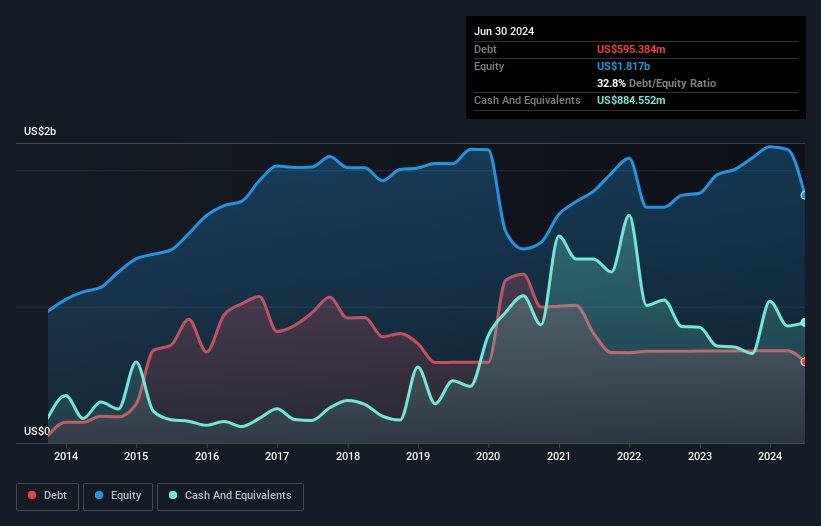Legendary fund manager Li Lu (who Charlie Munger backed) once said, 'The biggest investment risk is not the volatility of prices, but whether you will suffer a permanent loss of capital.' It's only natural to consider a company's balance sheet when you examine how risky it is, since debt is often involved when a business collapses. Importantly, Under Armour, Inc. (NYSE:UAA) does carry debt. But should shareholders be worried about its use of debt?
What Risk Does Debt Bring?
Debt assists a business until the business has trouble paying it off, either with new capital or with free cash flow. Part and parcel of capitalism is the process of 'creative destruction' where failed businesses are mercilessly liquidated by their bankers. However, a more common (but still painful) scenario is that it has to raise new equity capital at a low price, thus permanently diluting shareholders. By replacing dilution, though, debt can be an extremely good tool for businesses that need capital to invest in growth at high rates of return. The first step when considering a company's debt levels is to consider its cash and debt together.
See our latest analysis for Under Armour
What Is Under Armour's Debt?
You can click the graphic below for the historical numbers, but it shows that Under Armour had US$595.4m of debt in June 2024, down from US$675.0m, one year before. However, it does have US$884.6m in cash offsetting this, leading to net cash of US$289.2m.

How Strong Is Under Armour's Balance Sheet?
Zooming in on the latest balance sheet data, we can see that Under Armour had liabilities of US$1.72b due within 12 months and liabilities of US$1.33b due beyond that. Offsetting these obligations, it had cash of US$884.6m as well as receivables valued at US$684.7m due within 12 months. So it has liabilities totalling US$1.47b more than its cash and near-term receivables, combined.
Under Armour has a market capitalization of US$2.87b, so it could very likely raise cash to ameliorate its balance sheet, if the need arose. But it's clear that we should definitely closely examine whether it can manage its debt without dilution. While it does have liabilities worth noting, Under Armour also has more cash than debt, so we're pretty confident it can manage its debt safely.
But the bad news is that Under Armour has seen its EBIT plunge 13% in the last twelve months. We think hat kind of performance, if repeated frequently, could well lead to difficulties for the stock. There's no doubt that we learn most about debt from the balance sheet. But it is future earnings, more than anything, that will determine Under Armour's ability to maintain a healthy balance sheet going forward. So if you're focused on the future you can check out this free report showing analyst profit forecasts.
But our final consideration is also important, because a company cannot pay debt with paper profits; it needs cold hard cash. Under Armour may have net cash on the balance sheet, but it is still interesting to look at how well the business converts its earnings before interest and tax (EBIT) to free cash flow, because that will influence both its need for, and its capacity to manage debt. Looking at the most recent three years, Under Armour recorded free cash flow of 34% of its EBIT, which is weaker than we'd expect. That's not great, when it comes to paying down debt.
Summing Up
While Under Armour does have more liabilities than liquid assets, it also has net cash of US$289.2m. So although we see some areas for improvement, we're not too worried about Under Armour's balance sheet. Even though Under Armour lost money on the bottom line, its positive EBIT suggests the business itself has potential. So you might want to check out how earnings have been trending over the last few years.
When all is said and done, sometimes its easier to focus on companies that don't even need debt. Readers can access a list of growth stocks with zero net debt 100% free, right now.
New: AI Stock Screener & Alerts
Our new AI Stock Screener scans the market every day to uncover opportunities.
• Dividend Powerhouses (3%+ Yield)
• Undervalued Small Caps with Insider Buying
• High growth Tech and AI Companies
Or build your own from over 50 metrics.
Have feedback on this article? Concerned about the content? Get in touch with us directly. Alternatively, email editorial-team (at) simplywallst.com.
This article by Simply Wall St is general in nature. We provide commentary based on historical data and analyst forecasts only using an unbiased methodology and our articles are not intended to be financial advice. It does not constitute a recommendation to buy or sell any stock, and does not take account of your objectives, or your financial situation. We aim to bring you long-term focused analysis driven by fundamental data. Note that our analysis may not factor in the latest price-sensitive company announcements or qualitative material. Simply Wall St has no position in any stocks mentioned.
About NYSE:UAA
Under Armour
Engages developing, marketing, and distributing performance apparel, footwear, and accessories for men, women, and youth.
Adequate balance sheet and fair value.
Similar Companies
Market Insights
Community Narratives



